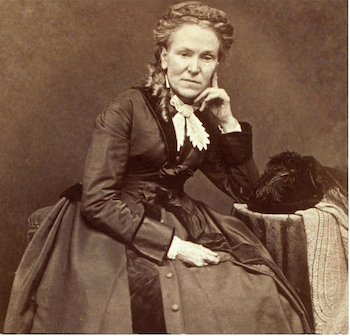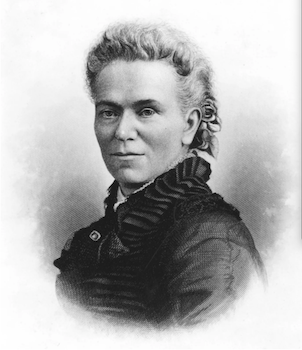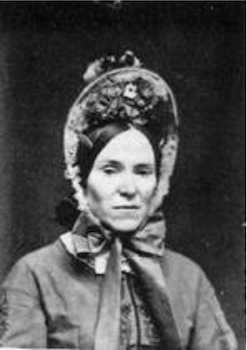
Born in Cicero, NY on March 24th, 1826, Matilda Joslyn Gage was the only daughter to a devout musician, Helen Leslie Joslyn, and physician, Dr. Hezekiah Joslyn. Stationing their house on the underground railroad in Cicero, Matilda was raised in a household of devoted abolitionists. Often, she would work closely alongside her parents in the pursuit of change. At a young age, it was evident she was written to change the face of history.
Growing up, Matilda’s parents prioritized her education. Thus, they became her primary instructors, homeschooling her through a variety of different subjects. Since her father was a doctor, Matilda was taught various subjects that ranged from anatomy, biology, and beyond just the core subjects: subjects that were deemed ,‘too masculine,’ for young girls to learn beyond their home. After receiving a primary education homeschooling with her father and mother, Matilda would transition to Clinton Liberal Institute in New York, a co- educational preparatory school. Following in her father’s footsteps, Matilda aspired to become a doctor. However, after multiple attempts, Matilda was rejected from every school because of her gender. Despite the heartbreak that followed with each rejection, Matilda pushed through to help create equal opportunities for women.
In 1845, Matilda married a merchant, Henry Gage. The couple settled in Fayette, NY and went on to have five children together. Prior to her contribution and career in activism, Matilda was a writer for her local newspaper. Alongside this, Matilda would frequently open her home as a safe haven for fugitive slaves. Consequently, she faced various prison threats, and charges from the government. However, she was rarely phased by these threats, and continued to leave her home open to those that needed safe-keeping.

Matilda’s first contribution and appearance to the public would be acclaimed at the third National Women’s Rights Convention in 1852. Her first address would distinguish her as one of the standing pillars to change history for women. This address connected her with like-minded women that shared the same passions, values, and mission as her, such as Susan B. Anthony and Elizabeth Cady Stanton. Together, these women would work together to help pave a road for change. In 1869, these women founded the National Woman's Suffrage Association and worked to empower others, pushing other figures to join their movement in demanding change. Serving as one of the primary founders and activists, Matilda’s skills as a writer were not neglected, as she continued to utilize her skills to adhere to her work, writing and editing for the first 3 volumes of “The History of Women's Suffrage.” Moreover, she co-authored the Declaration of Womens’ rights document, which was read at an Independence Day celebration in 1876. This document, along with the written volumes, would influence the way institutions and policies were implemented for women’s rights.
Throughout her activism career, Matilda would be distinguished by her radical beliefs that contradicted the consensus that surrounded the womens’ rights movements. Consequently, this meant she was written out of history. Unlike most, Matilda fought against the Church, as she believed that their indoctrination contributed to gender disparities and misogyny. She brought this up to the National Woman’s Suffrage Association to expose the impacts of religious teachings, however, they disregarded her and continued to forge on with a Christian-based feminist group. This collaboration would make Matilda leave the NWSA, as it stood against the beliefs of her own. She would commence to initiate the Women’s National Liberal Union. The objectives of the WNLU was to implement the natural rights of women within society, expose religious teachings for their contribution to misogyny, and to separate the Church and state liberties.
Although Matilda’s activism centered around womens’ rights, she also fought for the rights of Native Americans, and the honor of the signed treaties between nations. Grateful for her contributed efforts to fight for their rights, Matilda was given an honorary clan name, and was adopted into the Mohawk Nation. This recognition would allow her the ability to vote on the Council of Matrons: a board that makes decisions, and protects the tribe. Following this event, her curiosity led her to delve into the culture of Native Americans, and their perspective on the role of women within society. Specifically, Matilda began studying their ideas, and practices. Having received the ability to vote on the Council of Matrons, she realized that Native American women carried more power than white women. However, Native Americans were considered nothing beyond “savages” at the time, so her idea that they held more, or any power above white women was considered to be radical. Despite her outcasted beliefs, Matilda still took the teachings to empower, and teach western women her experiences with the Native Americans.

After years of the pursuit for change, Matilda’s life would come to a rest after she had a stroke on March 18th, 1898 in Chicago, IL. However, her legacy still lives on within literature and policies. Prior to her passing, her son-in-law, Frank Baum, admired her work, and was often encouraged by her to begin writing. A few years later, he would write The Wizard of Oz, taking inspiration from Matilda’s activism work and basing the fictional reality within a world where female matriarchy empowered and ruled.
In 1990, the term , “The Matilda Effect,” would be coined by scientist Margaret Rossiter. The term referred to women within male-dominated fields that received no credit, nor recognition for the work they put forth. It is utilized to honor how Gage utilized her voice to credit women for the things they’ve done that have been disregarded when men would tramp over their work.
Despite being written out of history for her radical beliefs, Matilda was a powerful leader in the women’s rights movement, and will continue to be so. In 1995, Matilda was inducted within the National Women’s Hall of Fame, where they recognized her work towards the pursuit for change. Even though her legacy may not be as recognized, nor received as much credit as other change-makers, it does not disregard her work. Her legacy continues to live within various daily commodities, and is an inspiration to women. Her work is a reminder to everyone that every woman deserves an equal opportunity, especially within a male-dominated society.
Why Did I Choose to Research Matilda Joslyn Gage?
I chose to research Matilda Joslyn Gage because of the way she was cheated out of receiving her recognition for her work. She dedicated her life and career to the pursuit of change, yet she was written out of history due to her radical beliefs. I wanted to be able to recognize her for her efforts, and contributions that were made to help move the womens’ rights movement. I believed that even if her beliefs were considered radical, she was still an impactful figure during this era, and she should still be recognized for all that she has done to help move change for women.
Works Cited
(n.d.). Matilda Joslyn Gage began her activism as an abolitionist. Her childhood home and her home after marriage to merchant Henry Hill. Retrieved July 30, 2024, from https://www.sec.state.ma.us/mus/pdfs/13-gage.pdf
Angelucci, A. (n.d.). Matilda Joslyn Gage. National Women's History Museum. Retrieved July 30, 2024, from https://www.womenshistory.org/education-resources/biographies/matilda-joslyn-gage
Hayes, C. (2019, December 11). Matilda Joslyn Gage. First Wave Feminisms. https://sites.uw.edu/twomn347/2019/12/11/matilda-joslyn-gage/comment-page-1/
Joslyn, Hezekiah. (n.d.). Freethought Trail. Retrieved July 30, 2024, from https://freethought-trail.org/profiles/profile:joslyn-hezekiah/
Matilda J Gage | Archives of Women's Political Communication. (n.d.). Archives of Women's Political Communication. Retrieved July 30, 2024, from https://awpc.cattcenter.iastate.edu/directory/matilda-j-gage/
Rodale, M. (2024, March 1). The Matilda Effect - by Maya Rodale - Hidden Herstories. Hidden Herstories. Retrieved July 30, 2024, from https://mayarodale.substack.com/p/the-matilda-effect
Social Welfare History Project Gage, Matilda (nee, Joslyn) (1826- 1898). (2020, May 12). Social Welfare History Project. Retrieved July 30, 2024, from https://socialwelfare.library.vcu.edu/woman-suffrage/gage-matilda-joslyn/
Taylor, R. (Executive Producer). (2021). American Oz [TV series]. PBS.
Wagner, E. (2021, November 29). Matilda Joslyn Gage (U.S. National Park Service. Retrieved July 30, 2024, from https://www.nps.gov/people/matilda-joslyn-gage.htm
This article was published on 9/2/2024